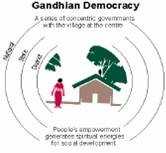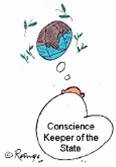|
Curbing Terrorism :
Nurturing Global Peace SK Sharma peoplefirst@devalt.org
The recent attacks in Delhi by terrorists have again forced us to find ways to deal with them. We propose a pragmatic solution that can nurture peace and prosperity in South Asia.
Gandhi
advocated true democracy,“village
republics”, as practised in ancient India.
When India was to attain
independence, the desire of its political system to centralise power
based on colonial practises, led to the partition of India,
assassination of Gandhi for partitioning India when he was totally
opposed to it, large scale migration of refugees, and the traumas of
Kashmir. On top of it, it imposed Soviet type centralised planning and
a controlled economy thus creating a mixed economy in a mixed up
polity. This has led to all round social, environmental, economic
and political degradation witnessed today. Rural poverty is now spilling
into burgeoning urban slums, and the curse of cross border terrorism is
hounding India. Facing bankruptcy, we have now opened the economy and
the political system is claiming credit for reforms when it is mere
correction of a past blunder. Since this is, in the final analysis our
problem, it is our moral responsibility to resolve it.
2. The only method of restoring peace and prosperity with social justice and equity in South Asia is true democratic empowerment of our people by restoring them local control over local resources as it was in India since ancient times. Described by Gandhi as Gram Swaraj (village republics), it is currently practised in the best Western democracies such as the Swiss. While allotting land, local communities monitor that business produces goods and services useful to society, creates dignified employment and generates wealth for expansion, and for philanthropy, but not for ostentatious consumption. This nurtures an egalitarian economic system, truly capitalism with a human face, in which all have equal rights and opportunities. US democracy is good, but for large land rights usurped by the settlers from the indigenous people that has made it highly capitalist. 3. The people of India are grateful to Rajiv Gandhi who, observing that out of a rupee only 16 paise reach the villages, initiated local empowerment. Reluctant to let go power, the legislators dillydallied for several years and finally promulgated the panchayati raj constitutional amendments that retain effective power with the state and have only decentralised corruption. 4. Power having got centralised, the political system is now unwilling and unable to revert it to the people. The only method by which true democracy can now be instituted is by the sovereign people themselves through referendum. Referendum is the supreme sovereign right of the people intrinsic to democracy and exists even if not provided for in a constitution. Soon after getting elected, Prime Minister, Tony Blair introduced reforms such as instituting parliaments for Scotland, Wales and Ireland and reinstating the position of Mayor of London, arrogantly abolished by Margaret Thatcher when she was Prime Minister, through referendum. Referendum is thus a recognised method of instituting political reforms. A procedure is however needed to enable the sovereign people exercise this right.
5.
To facilitate referendums, People First has conceptualised that apart
for an elected parliament and an independent judiciary, contemporary
democracy needs another institution, Sovereign Rights Commission with
the authority to direct referendum except on issues fundamental to
democracy or the integrity of the nation. There can, for example, be no
referendum on making the state theocratic or allowing region to secede.
Superior to the royal priest of bygone days, more like Gandhi, such a
commission will function as the non-corruptible conscience keeper of the
state based on the values of the state.
It is thus not a new institution but
an age old institution in a superior incarnation. 6. The Sovereign Rights Commission will, based on the wishes of the people ascertained by it, prepare a proposed constitution, and refer the present versus proposed constitution to the people through referendum. If people overwhelmingly vote in favour of the latter, the commission will then authenticate it, this time truly, in the name of the people as the supreme law of the nation. It will thereafter appropriately phase the reforms and monitor that they are properly instituted. India will be on the path of rejuvenation. Pakistan and other nations will come under the pressure of the world community to institute political reforms through a similar process. 7. The world will eventually become a confederation of self reliant local governments nurturing a just world order. We urge a global debate on instituting Sovereign Rights Commissions in every nation state since it provides a legitimate, non-violent process for realising a just world order with social justice and equity and protecting our only earth from total degeneration, a major global concern today.q |

